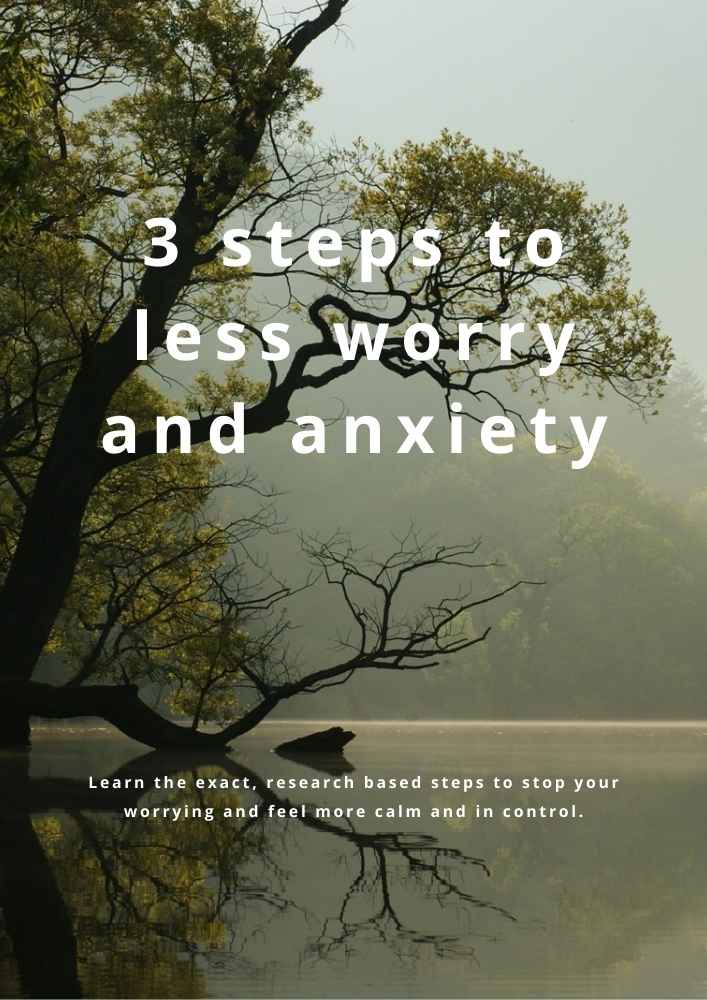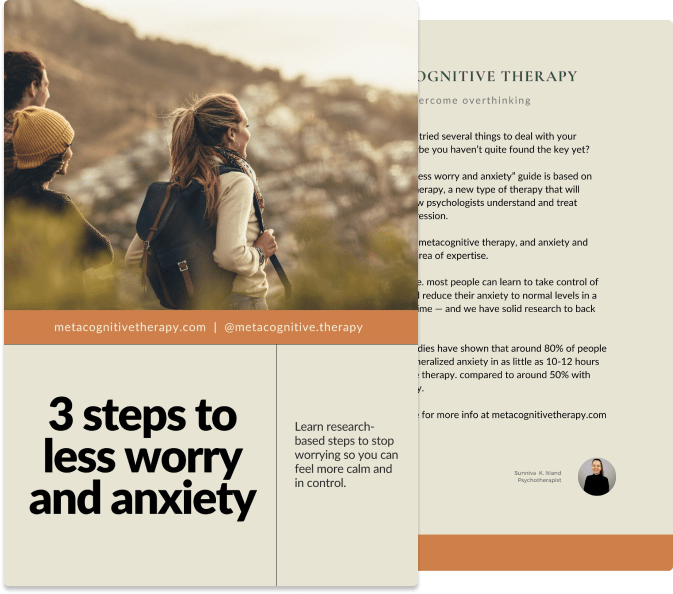How to prevent winter depression: Research-backed tips that improve SAD naturally

Download our best tips on reducing anxiety and worrying
Learn three powerful metacognitive therapy steps to stop the worry cycle, reduce anxiety, and feel calmer in everyday life.
.jpeg)
.jpeg)
Do you dread the moment the weather turns colder and the daylight dwindles? For a lot of people, seasonal depression can feel inevitable. But it doesn't have to be this way.
People go to great lengths to combat winter depression — changing the way they sleep, loading up on vitamins, chasing sunlight exposure, or giving up and hibernating until spring. While light therapy and vitamin D supplements can be helpful for many, they don't solve the entire problem.
What if the way we think and act has a bigger role than we realize in maintaining and reinforcing the symptoms of SAD? It turns out, avoiding seasonal depression starts with your mind and thinking patterns. Here's how to feel like yourself again this winter.
What is winter depression?
Also known as Seasonal Affective Disorder (SAD) or Seasonal Depression, the symptoms of seasonal depression generally resemble the symptoms we see in regular depression, but they start to show up in autumn and improve when spring hits.
The cause of SAD isn't fully understood. While it's often assumed that lack of sunlight is the main factor, several studies suggest that latitude might have less connection to developing winter depression than we commonly believe. Instead, research like the Tromsø Study points to social and cultural factors that can have a greater impact on who develops seasonal depression.
What are the symptoms of SAD?
Common symptoms can include:
- Low mood: A persistent feeling of sadness or emptiness.
- Low energy: It feels like you have zero reserves, and even small things can seem overwhelming.
- An increased need for sleep: You want to sleep more than usual, but never feel truly rested.
- Sweet cravings: Strong urges for sweets and carbohydrate-rich food.
- Weight gain: Often a result of increased food intake and reduced activity.
- Irritability: You might become more easily frustrated and have a shorter fuse.
- Lack of joy: A loss of interest in hobbies and activities you usually enjoy.
- Feeling sluggish: You can feel physically heavy and sluggish, especially in your arms and legs.
What improves winter depression?
These research-backed tips based on Metacognitive Therapy help prevent or ease winter depression.

Download our best tips on reducing anxiety and worrying
Learn three powerful metacognitive therapy steps to stop the worry cycle, reduce anxiety, and feel calmer in everyday life.
1. Don't spend autumn dreading the coming months
As soon as the temperatures drop and the leaves turn, it's easy to start envisioning how cold and miserable it's going to be. Many spend months ruminating over the coming dark period, and remembering how depressed they felt in previous winters.
But how does dreading and ruminating serve you? Does it make you feel better, or worse? Dread is a form of overthinking that drains you of energy and reinforces your fear of what's to come.
The reality is, no matter how much you worry or ruminate about it, winter will come. So try to spend as little time as possible dreading and anticipating it, which only prolongs your suffering. Instead, be present to what's happening around you in the now, and focus on what you have control over in this moment.
2. Stop monitoring how you're feeling
This advice may sound counterintuitive, but through Metacognitive Therapy (MCT) we've found that if you're feeling down, your mood and symptoms won't improve by constantly checking in on them.
Research shows that dwelling on and monitoring negative feelings just maintains and reinforces depression.
Instead, try to let your feelings regulate naturally (they'll come and go on their own, if you let them!), and direct your attention toward something more meaningful. When you focus outwards, you give yourself the chance to be influenced by something other than your current mood.
3. You can't rest your way to feeling energetic
Many believe that rest is the only solution to low energy levels, but resting too much can actually drain our energy. You might have experienced this yourself: You feel tired and lie down to rest, but more energy never shows up. Instead, you continue to feel drowsy and tired. The day passes, you're not productive, your mood hasn't shifted, and you feel hopeless.
This can become a vicious cycle, because the strategy you're using to feel better ultimately makes you feel worse.
Energy comes from activity: You get energy by using energy. So even when you feel tired and lethargic, try to do the activities you'd normally do if you felt good. Being active — whether it's taking a walk, playing outside, socializing, or starting a task — is one of the most important things you can do to avoid or recover from depression.
4. Turn your focus outward
When you're depressed, your attention is more often directed inward toward your thoughts and feelings. This makes you feel distant, disconnected, and not present.
Even though it might feel like this inner focus just happens by itself, it's actually something you have control over. You can choose to turn your focus back outward to what's happening around you.
Notice where you focus your attention… Is it directed inward on thoughts and feelings, or outward on conversations and what's happening around you? When you watch a movie, do you follow along, or do you fall into your thoughts? Try interrupting that inner focus the next time you catch yourself doing it, by directing your focus toward the tasks you're doing and the conversations happening around you.
You'll feel more present, and eventually you'll notice that the unpleasant feeling of unease and disconnection starts to fade.
5. Identify and cut the rumination
When you wake up feeling tired, low, and lacking energy, it's easy to start ruminating. You might fall into the trap of asking yourself: 'Why do I feel this way?', 'What if I never feel better?', 'How will I make it through this winter?'
The content of rumination often involves analyzing variations in mood and energy level, searching for solutions and answers, and thinking back to previous depressive episodes. But what starts as an attempt to find a solution, often ends up as prolonged thinking about how difficult and hopeless everything feels.
Research shows that rumination doesn't just make you depressed, it keeps you depressed. Instead of engaging in the rumination cycle, direct your attention back toward what you're doing. If you feel like you need to think about these things, you can try setting aside 15 minutes later in the day for rumination or problem-solving (we call this worry postponement). Most people find they don't end up needing this worry window — but it shows them that worry and rumination is within their control, and that it loses urgency and importance if we allow it to pass without interference.
Set yourself up for a better winter
Even if you've experienced it in the past, you're not doomed to continue struggling with winter depression. By changing the way you relate to your negative thoughts about winter, and reducing the time you spend ruminating, you'll already feel a difference in how you approach this season.
If you're looking for more support this winter, Metacognitive Therapy is a groundbreaking approach to depression that can help you break the patterns that maintain the condition. Studies show that up to 80% of people who use MCT treatment recover in just 8-12 therapy sessions.
Interested in learning if MCT is right for you? Take the quiz today to find out if it can help.
Sources:
Seasonal affective disorder and latitude: a review of the literature
The limited influence of latitude on rates of seasonal affective disorder



